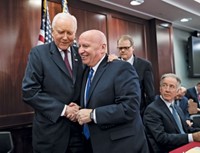Advertisement
Grab your lab coat. Let's get started
Welcome!
Welcome!
Create an account below to get 6 C&EN articles per month, receive newsletters and more - all free.
It seems this is your first time logging in online. Please enter the following information to continue.
As an ACS member you automatically get access to this site. All we need is few more details to create your reading experience.
Not you? Sign in with a different account.
Not you? Sign in with a different account.
ERROR 1
ERROR 1
ERROR 2
ERROR 2
ERROR 2
ERROR 2
ERROR 2
Password and Confirm password must match.
If you have an ACS member number, please enter it here so we can link this account to your membership. (optional)
ERROR 2
ACS values your privacy. By submitting your information, you are gaining access to C&EN and subscribing to our weekly newsletter. We use the information you provide to make your reading experience better, and we will never sell your data to third party members.
Education
Graduate students protest U.S. tax plan
Proposal to make tuition taxable could make students pay thousands more each year
by Andrea Widener
November 30, 2017
| A version of this story appeared in
Volume 95, Issue 48

Thousands of U.S. graduate students walked away from their labs, teaching assignments, and classes on Nov. 29 to protest provisions in a Republican tax reform package that could force them to pay thousands of dollars in extra taxes.
University of Minnesota, Twin Cities, chemistry grad student Becky Rodriguez joined hundreds of other protesters braving –5.5 °C temperatures to show her outrage at the proposal.
“I know that if this were to pass, I would have to drop out of graduate school because I wouldn’t be able to afford it,” Rodriguez says.
Currently, stipends that cover tuition are tax-free for graduate students. But that would change under the tax reform bill that the U.S. House of Representatives passed in November. It could mean thousands of dollars in extra taxes for graduate students, most of whom make less than $30,000 a year.
The Senate version of the measure currently keeps tuition waivers for graduate students tax-free, but the bill is still under negotiation.
“That is part of the reason that we wanted to escalate to a larger action across the country,” says Jack Nicoludis, a chemistry graduate student who helped plan the action at Harvard University.
Nicoludis connected with other protesters nationwide through his graduate student union. He’s also been participating in phone banks to call legislators.
“We want to make sure that both the Senate and the House know that this would affect us horribly, not only individual grad students but the competitiveness of higher education in the U.S.,” he says.
Rodriguez is especially concerned that the additional taxes would disproportionately affect minorities and first-generation students like her, whose parents can’t help shoulder the extra financial burden.
“Going to grad school shouldn’t be a matter of wealth. It should be the ability to pursue science, the ability to pursue things you are passionate about,” she says. “I hope that people see this as a wake-up call.




Join the conversation
Contact the reporter
Submit a Letter to the Editor for publication
Engage with us on Twitter